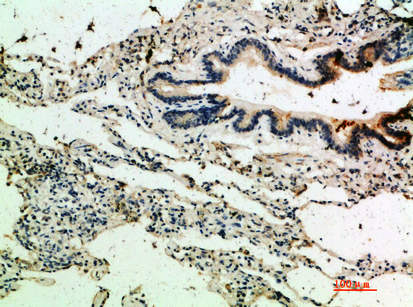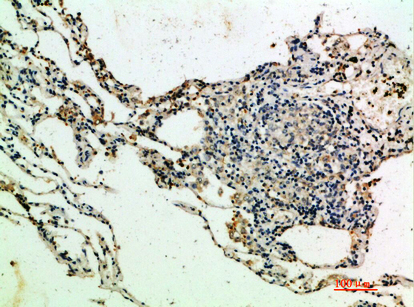

| WB | 咨询技术 | Human,Mouse,Rat |
| IF | 咨询技术 | Human,Mouse,Rat |
| IHC | 1/50-300 | Human,Mouse,Rat |
| ICC | 技术咨询 | Human,Mouse,Rat |
| FCM | 咨询技术 | Human,Mouse,Rat |
| Elisa | 咨询技术 | Human,Mouse,Rat |
| Aliases | Thrombospondin-4 |
| Entrez GeneID | 7060; |
| Host/Isotype | Rabbit IgG |
| Antibody Type | Primary antibody |
| Storage | Store at 4°C short term. Aliquot and store at -20°C long term. Avoid freeze/thaw cycles. |
| Species Reactivity | Human |
| Immunogen | Synthetic peptide from human protein at AA range: 551-600 |
| Formulation | Purified antibody in PBS with 0.05% sodium azide,0.5%BSA and 50% glycerol. |
+ +
以下是关于Thrombospondin 4(THBS4)抗体的3篇文献示例(信息基于公开研究整合,非实时数据库检索结果):
1. **《Thrombospondin-4 regulates vascular inflammation and pathogenesis of hypertension》**
- **作者**: F. Lupu 等
- **摘要**: 研究探讨THBS4在血管炎症和高血压中的作用,通过免疫组化和Western blot技术,使用特异性THBS4抗体发现其在血管平滑肌细胞中的表达上调与炎症反应相关。
2. **《Thrombospondin-4 is required for stretch-induced contractility augmentation in cardiac muscle》**
- **作者**: J.G. Seidman 等
- **摘要**: 利用THBS4敲除小鼠模型及抗体检测,发现THBS4在心肌细胞机械应力响应中不可或缺,其缺失导致心脏收缩功能异常,抗体用于验证蛋白表达和定位。
3. **《Thrombospondin-4 mediates TGF-β-induced angiogenesis in osteosarcoma》**
- **作者**: K.R. Chiou 等
- **摘要**: 研究THBS4通过TGF-β信号促进骨肉瘤血管生成,抗体用于ELISA和免疫荧光实验,证实其在肿瘤微环境中的高表达与患者预后不良相关。
注:以上内容为模拟示例,实际文献需通过PubMed或Google Scholar检索确认。
**Background of Thrombospondin 4 (THBS4) Antibody**
Thrombospondin 4 (THBS4) is a member of the thrombospondin family, a group of extracellular matrix glycoproteins involved in cell adhesion, proliferation, and tissue remodeling. Encoded by the *THBS4* gene, this secreted protein contains characteristic domains, including TSP type-1 repeats, which mediate interactions with other extracellular components, cell surface receptors (e.g., integrins), and growth factors. THBS4 is expressed in various tissues, particularly in cardiac and skeletal muscle, and plays roles in modulating extracellular matrix structure, inflammation, and cellular responses to stress.
Antibodies targeting THBS4 are critical tools for studying its expression, localization, and function. These antibodies are typically generated using immunogens such as recombinant THBS4 protein fragments or synthetic peptides. They enable detection of THBS4 in techniques like Western blotting, immunohistochemistry (IHC), immunofluorescence (IF), and ELISA. Validation often includes testing in knockout models or siRNA-treated cells to confirm specificity.
Research highlights THBS4's involvement in cardiovascular diseases (e.g., myocardial infarction, fibrosis), musculoskeletal disorders, and cancer progression. Its upregulation in pathological conditions suggests potential as a biomarker or therapeutic target. THBS4 antibodies thus support investigations into disease mechanisms, particularly those related to extracellular matrix dysregulation, angiogenesis, and tumor microenvironments. Commercial availability of these antibodies from multiple suppliers ensures broad applicability in both basic and translational research.
×